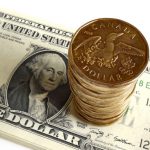The yen advanced for a third day against the US dollar, hitting the highest level in more than a week, after the Bank of Japan refrained from adding extra stimulus as it tries to assess the impact of a controversial sales-tax increase introduced at the beginning of the month.
USD/JPY hit a session low at 102.66 at 07:27 GMT, after which consolidation followed at 102.72, losing 0.37% for the day. Support was likely to be found at March 28th low, 102.04, while resistance was to be met at April 7th high, 103.34. The pair registered a third straight week of advances, adding 0.4% last week.
The Bank of Japan policy makers kept their pledge of targeting an annual increase in the money supply of 60 trillion yen to 70 trillion yen, after ending their two-day policy meeting today.
“Japans economy has continued to recover moderately as a trend, albeit with some fluctuations due to the consumption tax hike,” the central bank said in its statement after the meeting.
“Private consumption and housing investment have remained resilient as a trend with improvement in the employment and income situation,” it added.
The central bank next meeting is scheduled for April 30, when the bank will release its latest growth and inflation forecasts.
“There are slight expectations the BOJ will take some action at a meeting on April 30,” Yujiro Goto, a London-based senior currency strategist at Nomura International Plc, said before the BOJ ended today’s meeting, cited by Bloomberg. “Kuroda is most likely to remain very bullish at a press conference today, which may damp expectations of additional easing and drive up the yen.”
Meanwhile, investors’ attention was focused on the minutes from the March 18-19 Fed policy meeting, due to be released tomorrow. The Federal Open Market Committee, which cut monthly asset purchases by $10 billion at each of its past three meetings, is set to reconvene at the end of the month.
Federal Reserve Chair Janet Yellen said last week that the central bank needed to do more to fight against unemployment, because keeping interest rates near zero for more than five years and swelling its balance sheet with asset purchases seemed not to be enough. She also added that the US economy still needed monetary stimulus for “some time” and that most of the Fed officials shared the same opinion.





